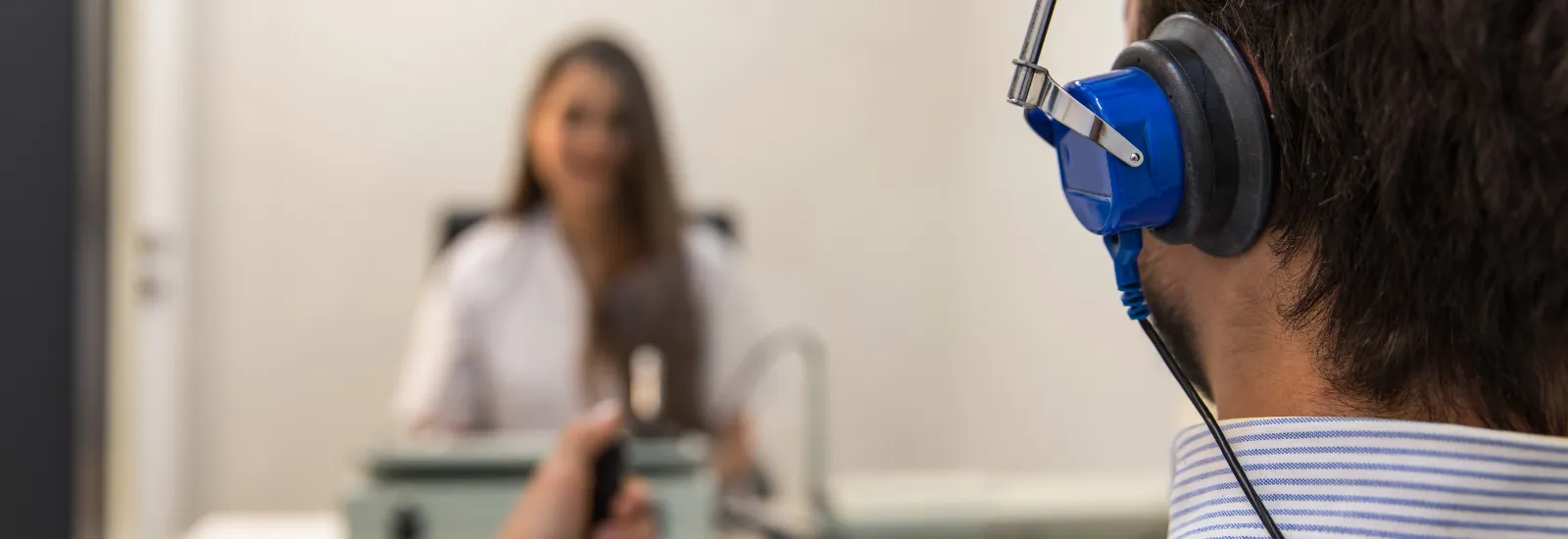
Do you need a hearing screening?
During the month of May, the American Speech-Language-Hearing
Association (ASHA) celebrated Better Hearing & Speech Month to raise awareness for hearing screenings and the treatment of
communication disorders. A screening is an important tool for detecting hearing
loss early so effective treatment can begin.
Hearing screening versus hearing test
A hearing screening is a quick and painless process to determine how well you hear certain sounds. The screenings are conducted by a nurse, teacher, or audiologist. Screenings are pass or fail. A 'pass' means there are no signs of significant hearing loss. Its important to note that screenings don't always diagnose mild hearing loss.
A hearing test, also called a hearing evaluation, is a more detailed test of a person's hearing. It is conducted by an audiologist. A hearing test can determine the type of hearing loss, its severity, possible causes, and how to treat it.
When do you need a hearing screening?
Hearing screenings are important for
infants, children, and adults. Since our hearing can
change throughout our lives, it's important to monitor yours as a part of your
overall health.
- Newborns and infants. Newborns often have their hearing screened at birth. The ASHA recommends a newborn hearing screening before infants are 1 month old. It's not uncommon for a newborn to fail a screening, but this doesn't mean hearing loss is present. Infants are often referred to an audiologist for another screening before they're 3 months old.
- Children and adults. Children receive hearing
screenings several times during their school-age years. For adults, ASHA
recommends hearing screenings every 10 years until age 50.
- Older adults. Hearing loss can happen to children but is more common as we age. ASHA recommends hearing screenings every three years after age 50.
Signs of hearing loss may include frequently
asking people to repeat themselves or turning up the volume on devices,
difficulty hearing in loud environments, or trouble with balance. Some research
shows untreated hearing loss may even
lead to dementia among older adults. If you recognize these symptoms in yourself
or others, it's time for a hearing test.
Types of hearing screenings and tests
There are several methods
used to conduct a hearing screening. All are painless and fast.
- Auditory brainstem
response (ABR). ABR screenings use electrodes placed on
the head to determine if the brain registers a sound. A person can rest or
sleep during the screening. This method is often used for newborns.
- Otoacoustic emissions
(OAE).
OAEs use a small earphone to deliver sounds and measure how they come back. No
response is required from the person being tested. OAEs are also used to screen
newborns.
- Pure-tone testing. This hearing test uses
headphones to deliver a beeping sound at various volumes and frequencies. The
person being tested is required to respond each time they hear a beep. This
method is often used to screen for hearing in older children and adults. It's
also the method typically used in schools or at doctor's offices.
Causes of hearing loss
The World Health
Organization estimates more than 430 million people worldwide require treatment
for some form of hearing loss. Yet many people who could benefit from this
treatment don't receive it. Understanding if you're at risk for hearing loss is
critical to avoiding treatment delays.
The following factors may
increase the risk for hearing loss:
- Chronic ear infections. Repeated ear infections
or fluid in the ear can damage hearing.
- Complications in utero or
as a newborn. Infections or lack of oxygen before or after a baby is born can
lead to hearing loss.
- Genetics. Hearing loss can be
hereditary.
- Head trauma. A traumatic brain injury
can cause damage to the eardrum or inner ear.
- Infections or diseases. Autoimmune diseases,
meningitis, or viral infections can cause hearing loss.
- Loud noises. Repeated loud noises
over time, such as concerts, sports events, or headphone use can result in
hearing loss.
- Ototoxic medications. Several forms of
over-the-counter and prescription medicines can lead to hearing loss if used
over long periods of time. Consult a medical provider about your medications to
prevent possible hearing loss.
Prevent hearing loss
Receiving a regular
hearing screening is an important tool for identifying hearing loss, but taking
the following steps can reduce or prevent hearing loss as well:
- Avoid loud noises. Noise exposure is
dangerous if it hurts your ears, causes muffled hearing, or requires you to
raise your voice to be heard. It's helpful to take breaks during loud events,
wear earplugs, and wait at least 18 hours before further loud noise exposure.
- Use headphones safely. When using headphones,
keep the volume at 60%. Noise-canceling headphones help prevent the need to
turn up the volume. For every hour of headphone use, take at least a
five-minute break.
- Use work precautions. Use hearing protection and practice hearing safety in the workplace.
Interested in learning more about
hearing screenings and tests? Request an appointment with an audiologist at Reid Health Hearing Center.

